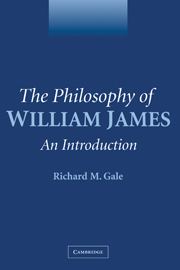Book contents
- Frontmatter
- Contents
- Preface
- Introduction
- PART I THE PROMETHEAN PRAGMATIST
- 1 The Ethics of Prometheanism
- 2 The Willfulness of Belief
- 3 The Freedom of Belief
- 4 The Will to Believe
- 5 The Ethics of Truth
- 6 The Semantics of “Truth”
- 7 Ontological Relativism: William James Meets Poo-bah
- PART II THE PASSIVE MYSTIC
- Bibliography of Works Cited
- Suggested Further Readings
- Index
3 - The Freedom of Belief
Published online by Cambridge University Press: 06 January 2010
- Frontmatter
- Contents
- Preface
- Introduction
- PART I THE PROMETHEAN PRAGMATIST
- 1 The Ethics of Prometheanism
- 2 The Willfulness of Belief
- 3 The Freedom of Belief
- 4 The Will to Believe
- 5 The Ethics of Truth
- 6 The Semantics of “Truth”
- 7 Ontological Relativism: William James Meets Poo-bah
- PART II THE PASSIVE MYSTIC
- Bibliography of Works Cited
- Suggested Further Readings
- Index
Summary
The previous chapter presented James's reasons for thinking that belief is an intentional action or inducible by intentional actions. The purpose of this chapter is to explore James's reasons for claiming that belief also is a free action; for if it is not free, we cannot have, as the conclusion of his Master Syllogism asserts, a moral obligation to believe in a way that maximizes desire–satisfaction, given that ought implies can. This chapter is subdivided into four parts. The first presents James's theory of freedom. The second gives his reasons why it cannot be decided on epistemic or evidential grounds that we are or that we are not free in this sense. The third expounds his reasons for thinking that it is desirable in terms of maximizing desire–satisfaction to believe that we are free. The fourth presents some objections to his theory of freedom and how James could respond to them. It will be found in Chapter 4 that among the several necessary conditions for having a will-to-believe option are that the proposition to be believed cannot have its truth or falsity determined on epistemic or evidential grounds and that believing it has desirable consequences. Thus, if one or more of the objections to James's theory should prove fatal, his theory would not qualify as a candidate for a will-to-believe option, since its falsity can be epistemically determined.
Throughout his adult life, James ardently believed in the libertarian doctrine of free will, replete with its contra-causal spiritual acts of will.
- Type
- Chapter
- Information
- The Philosophy of William JamesAn Introduction, pp. 57 - 74Publisher: Cambridge University PressPrint publication year: 2004



